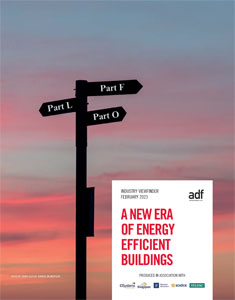
The 2022 changes to Parts L and F of the Building Regulations for buildings (plus the introduction of Part O covering overheating for domestic buildings) bring some significant upgrades in specification. Part of the overall aim is to move towards the Future Homes Standard in 2025 (which will see a 75% reduction in carbon emissions), with the chief goal being lowering emissions towards the 2050 zero carbon legal target. The interim changes mean that after June 2022, new buildings must produce as a minimum 31% less carbon compared with current Building Regulations. This is the first update to Part L in nearly a decade, with the initial emphasis put on building fabric, followed by low-carbon heating technologies. The changes to Part F (covering ventilation) are intended to ensure that as buildings become more energy efficient and air tight, air quality is not adversely affected. Similarly, Part O is introduced to ensure that consequent overheating is mitigated so is not a risk to occupants.
The this White Paper ADF discovered architects’ views on these important changes, and the practical solutions they are engaging in.
For more Architects’ Datafile research studies, click here.
Request the full report
Tagged
OrganisationsID Systems Kingspan Insulation Reynaers Aluminium Schöck VELFAC

